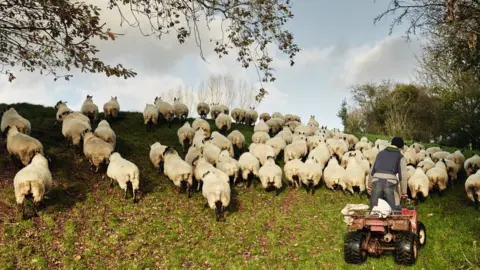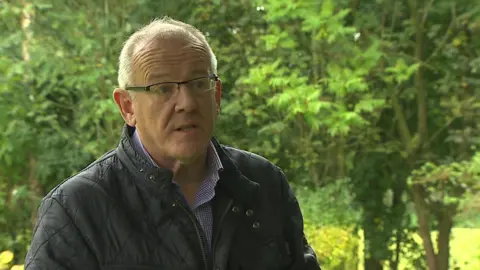Brexit: Farming 'vital as Welsh language stronghold'
 Getty Images
Getty ImagesFarming's importance to Welsh must be recognised in post-Brexit plans to support the industry, the man in charge of promoting the language has said.
Welsh language commissioner Aled Roberts said funding had to be focused on helping family farms survive.
Census figures suggest 43% of agricultural workers speak Welsh, compared with 19% of Wales' population.
The Welsh Government said it wanted to help the sector ensure a sustainable future for the language.
Mr Roberts was responding to the recommendations of a recent report about how farmers could help the government meet its goal of one million Welsh speakers by 2050.
Before the pandemic, Farming Connect researchers held workshops across the country, visiting agricultural shows and the National Eisteddfod to canvass opinion.
Project leader Eirwen Williams said the findings were timely given ministers were looking at designing a new system to replace EU agricultural subsidies.
She said the main theme was that people wanted to see support for family-run farms, which play a "vital" role in supporting Welsh.
It was said they do this by enabling families and young people to stay in rural areas, leading to thriving schools, businesses and the long-term sustainability of the language.
"Many felt there should be a cap on how much one business can receive - to hinder farms getting bigger and bigger," Ms Williams said.
"And that there should be support mechanisms especially targeted at the smaller farms."

Mr Roberts said he would write to the government to discuss the report's findings.
"This sector is a stronghold of the language," he said.
"As we consider the shape of things after Covid and after Brexit, there is a danger that this is not part of the consideration.
"Without the agricultural subsidies recognising the importance of the family farms to the Welsh language, there will be erosion.
"There's also a need for the government, through the crisis that we've been through, to actually ensure that support is given to maintain organisations that are important in rural life, such as the Young Farmers' Clubs."
The report also called for changes to the planning system to help keep young people in rural areas by supporting farm diversification and rural enterprises, as well as facilitating the building of new houses on farmland, particularly in areas where demand for second homes had pushed up property prices.
Measures are needed too, the report said, to protect Welsh place names to ensure the language and heritage remain visible.
Young Farmers' Clubs (YFC) were praised for supporting and promoting Welsh and it was recommended the funding they get from Welsh Government be formalised.
 YFC Wales
YFC WalesWales YFC chairwoman, Katie Davies, said extra funding would be welcome given the difficulties it faced because of coronavirus.
She added: "I'm a Welsh learner and actually the YFC movement, and the agricultural community more widely, have increased my confidence in speaking it, more so than anything else - even school."
The Welsh Government said it was "grateful" to Farming Connect and others for the work carried out for the report and would take the findings into account as it developed its sustainable farming scheme.
A spokesman said: "We want to help farmers as they look to manage their farms and support the needs of future generations, including the sustainability of the Welsh language."
